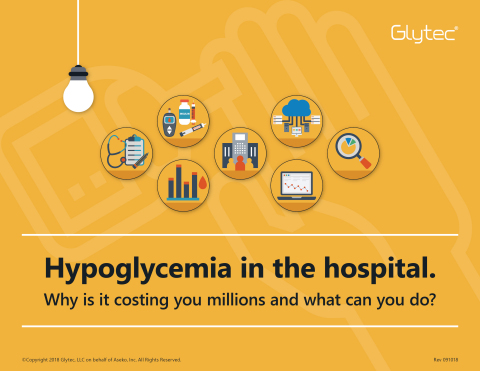Hypoglycemia in the hospital is common, costly, extremely serious and largely preventable, but many c-suite and business office executives are unaware of what it is, why it occurs or the significant impact it has on patient safety, outcomes and economics.
WALTHAM, Mass.--(BUSINESS WIRE)-- Hypoglycemia in the hospital is common, costly, extremely serious and largely preventable, but many c-suite and business office executives are unaware of what it is, why it occurs or the significant impact it has on patient safety, outcomes and economics. A new eBook from Glytec, offered free of charge at the company's website, shines a light on critical concerns surrounding hypoglycemia and helps healthcare organizations understand how to mitigate risks and initiate optimal prevention strategies. Availability of the eBook is especially timely given the hypoglycemia quality measure currently under development by the Centers for Medicare & Medicaid Services (CMS).
This press release features multimedia. View the full release here: https://www.businesswire.com/news/home/20181030005290/en/

A new eBook from Glytec, offered free of charge at the company's website, shines a light on critical concerns surrounding hypoglycemia and helps healthcare organizations understand how to mitigate risks and initiate optimal prevention strategies. (Graphic: Business Wire)
Download the eBook here.
"Not unlike blood pressure, temperature and other vital signs, when blood glucose is outside the normal range, safety risks escalate and incidence of complications and sentinel events increase dramatically," explains Glytec's Chief Medical Officer and diabetologist, Andrew S. Rhinehart, MD, FACP, FACE, CDE, BC-ADM, CDTC. "Most hospital executives have heard of sepsis and understand its gravity, but the fact is, hypoglycemia can also have potentially catastrophic consequences, including coma, stroke, paralysis, brain damage, cardiac arrest… and, unfortunately, it can even result in patient death."
The eBook cites a recent study by the Agency for Healthcare Research and Quality (AHRQ) which revealed that an adverse drug event involving a hypoglycemic agent adds 31 percent to the overall cost of care for an inpatient stay, ranging from a marginal cost of $2,747 for heart failure to $9,054 for major surgery, with an average marginal cost of $4,312. The study also showed a 9.7 percent probability of an adverse drug event for any patient exposed to a hypoglycemic agent, with incidence occurring at a rate of 23.8 per 1,000 discharges.
For the average 300-bed hospital with 15,000 annual discharges, this is tantamount to a cost of $1,539,384 a year, while for the average 900-bed hospital with 55,000 annual discharges, the cost is $5,644,408 a year.
Hypoglycemia has been identified as the third most common adverse drug event among hospitalized patients covered by Medicare. People with diabetes are the most affected by hypoglycemia, as glucose control is the primary concern for their health and well-being. Given 25 to 30 percent of hospitalized patients have diabetes, incidence of hypoglycemia is a major issue and a considerable challenge for healthcare organizations nationwide. People without diabetes are also vulnerable to hypoglycemia. While hospitalized, an estimated 12 percent experience a form of temporary diabetes referred to as ‘stress hyperglycemia’ brought on by the stress of illness or treatment received.
Insulin is the #1 precipitating variable to incidence of hypoglycemia. "Because insulin dosing is complex and dangers involved with insulin administration are significant, clinical inertia is widespread, meaning many providers hesitate to prescribe insulin or to adjust dosing after they do, even when the indications are present. This often stems from fear of causing hypoglycemia," says Glytec's Vice President of Clinical Services, Melanie E. Mabrey, DNP, ACNP-BC, BC-ADM, CDTC, FAANP. "Our eGlycemic Management System® removes many of these barriers and allows providers to confidently prescribe insulin and to trust that dosing recommendations are safe and efficacious. Most of our clients experience a reduction in hypoglycemia of greater than 70 percent, and for many, that number is as high as 90 to 98 percent."
About Glytec
Glytec is the pioneer of personalized digital therapeutics, enabling best practices for inpatient and outpatient insulin optimization. The company’s patented and FDA-cleared software-as-a-medical-device solutions improve the safety and health of people with diabetes and make insulin a more effective medication option for the millions unable to achieve their treatment goals. Glytec combines evidence-based decision support technologies with expert clinical services to optimize insulin therapies in the hospital and at home, leading to reductions in hypoglycemia and other complications as well as avoidable ED visits, hospitalizations, readmissions and drug waste. The company has offices in Waltham, Massachusetts and Greenville, South Carolina. For more information visit www.glytecsystems.com.
View source version on businesswire.com: https://www.businesswire.com/news/home/20181030005290/en/
Source: Glytec
Smart Multimedia Gallery
A new eBook from Glytec, offered free of charge at the company's website, shines a light on critical concerns surrounding hypoglycemia and helps healthcare organizations understand how to mitigate risks and initiate optimal prevention strategies. (Graphic: Business Wire)







